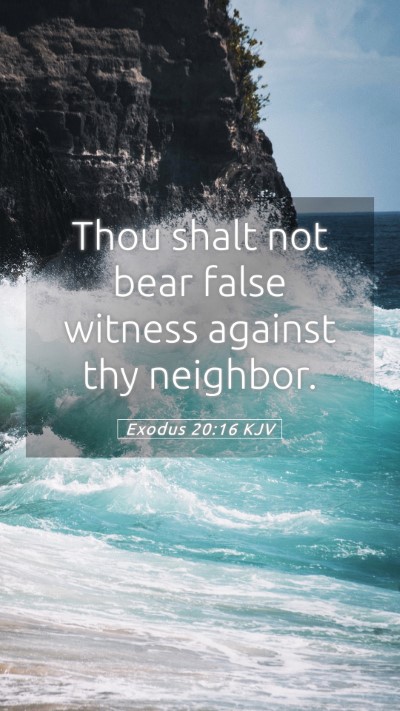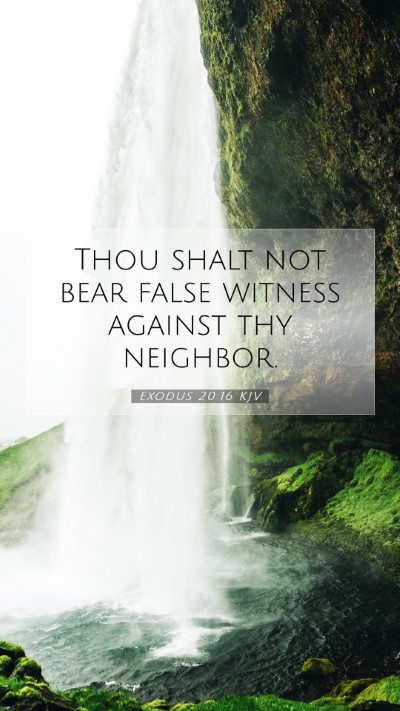Understanding Exodus 20:16
Bible Verse: Exodus 20:16
Verse Text: "You shall not bear false witness against your neighbor."
Overview
Exodus 20:16 is one of the Ten Commandments, which form a crucial part of God's moral law as given to the Israelites. This commandment underscores the importance of truthfulness in interpersonal relationships, particularly in legal and communal matters.
Bible Verse Meanings
This verse speaks to the integrity of one's testimony and the moral obligation to speak the truth about others. The implications of this commandment stretch far beyond mere courtroom settings and delve into the realms of honesty, respect, and ethical conduct.
Insights from Public Domain Commentaries
-
Matthew Henry:
Matthew Henry emphasizes that bearing false witness is a serious sin that disrupts social justice and trust within a community. It teaches that honesty should be upheld not only in formal declarations but also in everyday conversations. This verse calls believers to uphold truthfulness at all times.
-
Albert Barnes:
Albert Barnes highlights how this commandment is particularly relevant in maintaining social order and personal relationships. He suggests that false testimony leads to injustices and can ruin reputations. Therefore, this commandment serves as a necessary safeguard for the welfare of society.
-
Adam Clarke:
Adam Clarke notes that the principle behind this commandment encourages a broader commitment to honesty and integrity. He indicates that this directive extends to avoiding gossip and slander, urging individuals to consider the weight of their words and the potential harm they can cause.
Application of the Verse
This commandment calls on believers to reflect on their statements about others and to speak truthfully. It encourages personal integrity and respect for others, fostering a community built on trust. In practical terms, this means avoiding gossip, slander, and deceit, and encouraging truthful communication in all aspects of life.
How to Apply This Verse to Daily Life
- In Personal Conversations: Always strive to be truthful and avoid exaggeration or misrepresentation.
- In Community: Foster an environment that values truth-telling and discourage falsehoods.
- In Legal Situations: Understand the importance of honesty in testimonies and information shared in court or public assemblies.
Bible Study Insights
Understanding Exodus 20:16 in the context of the entire chapter highlights the foundational role of honesty in society. It invites further exploration into how this principle is integrated into New Testament teachings, especially in the context of loving one's neighbor.
Additional Bible Cross References
- Proverbs 6:16-19: A warning against seven things the Lord hates, including a lying tongue.
- Leviticus 19:11: Commanding the Israelites not to lie to one another.
- Matthew 5:37: Jesus teaches that one’s word should suffice; anything beyond that comes from evil.
Related Topics for Further Study
- Bible Study Lessons on Honesty: Explore lessons focusing on building integrity within faith communities.
- Online Bible Study on the Ten Commandments: Delve deeper into the meanings and applications of each commandment.
- Understanding Difficult Bible Passages: An analysis of how to interpret commandments in modern contexts.
Conclusion
Exodus 20:16 encapsulates the need for honesty in all dealings with others. A commitment to truth not only upholds the law of God but also fosters stronger communities based on mutual respect and integrity. Whether in personal relationships or broader societal interactions, this commandment serves as a guiding principle for behavior.


